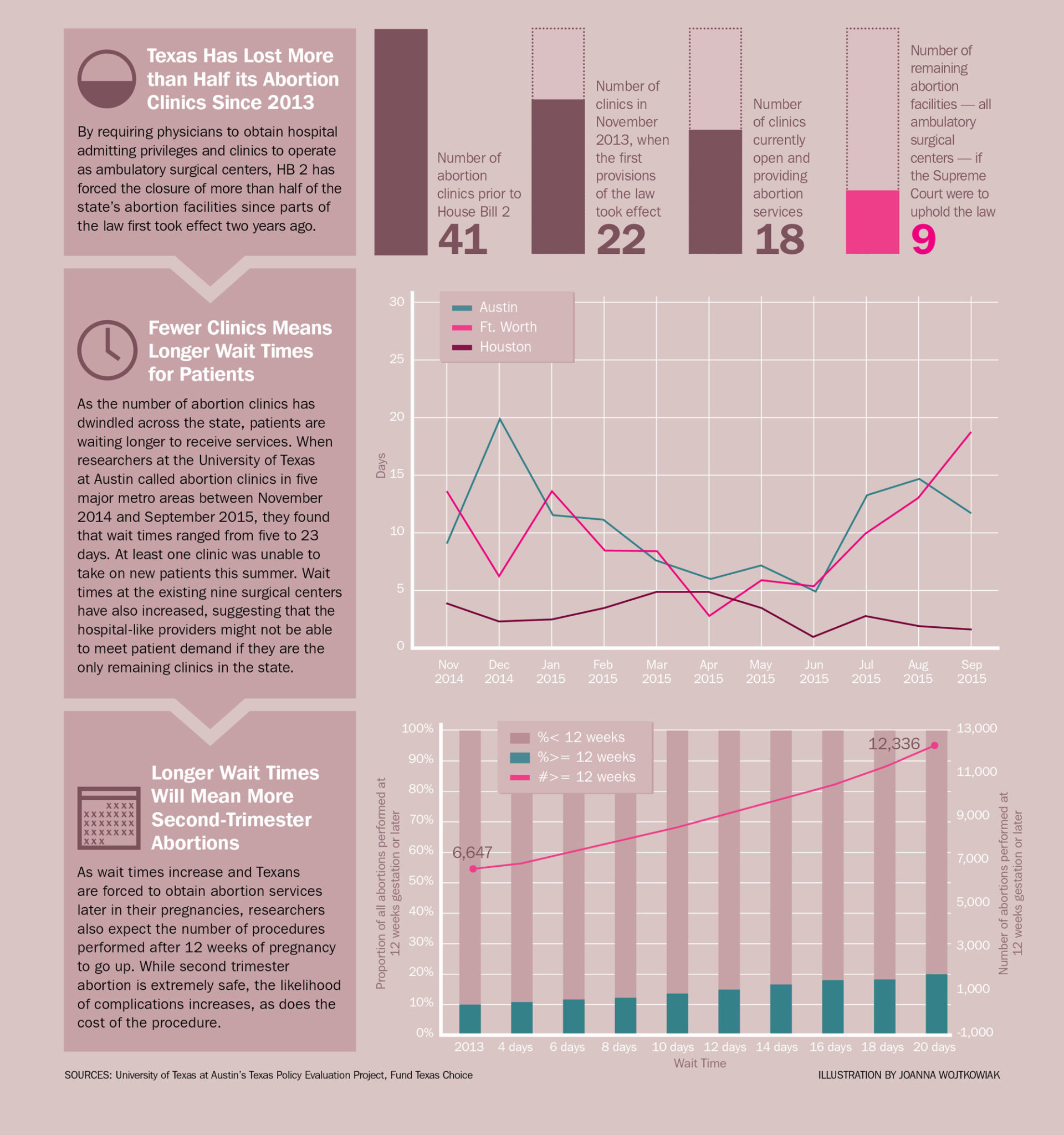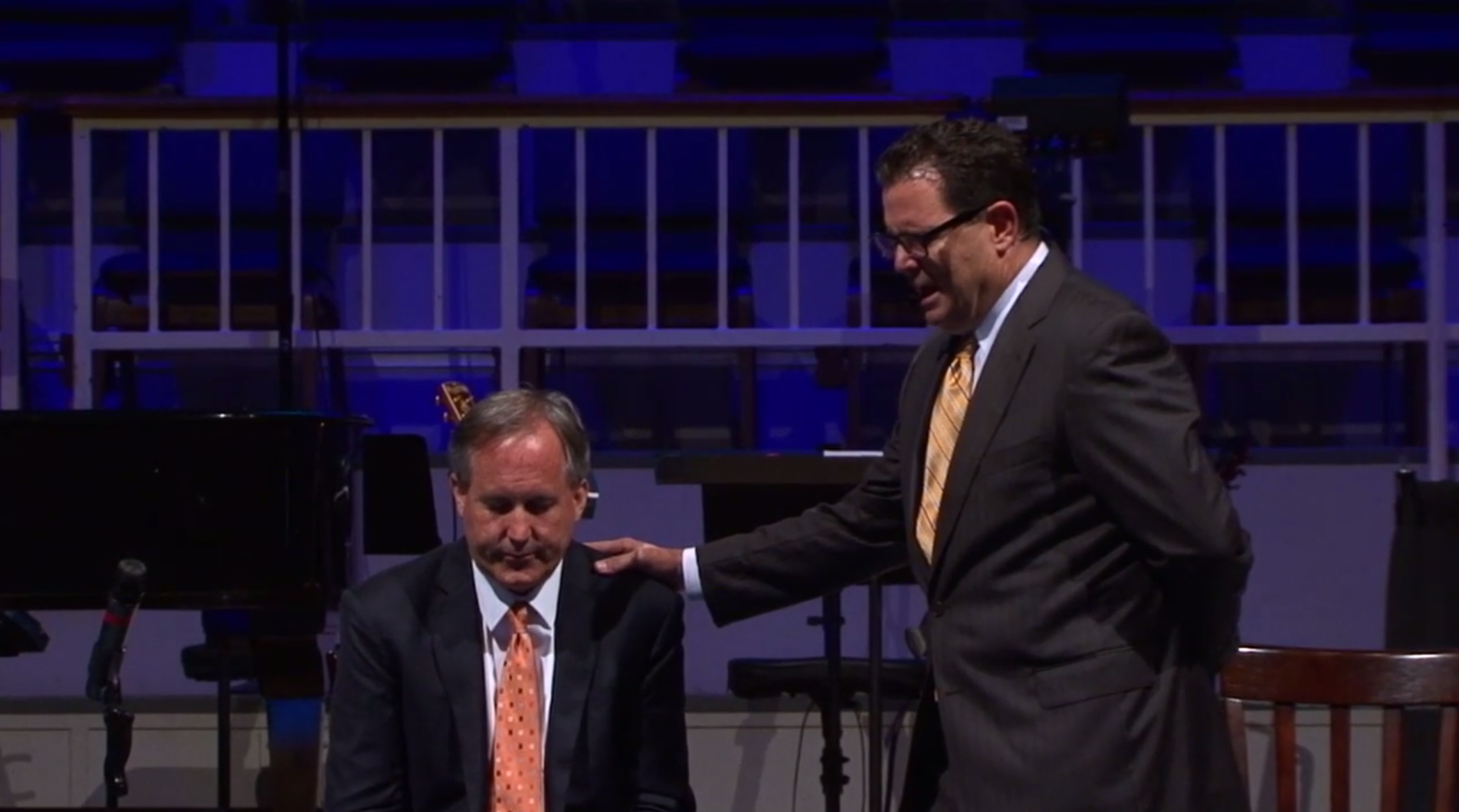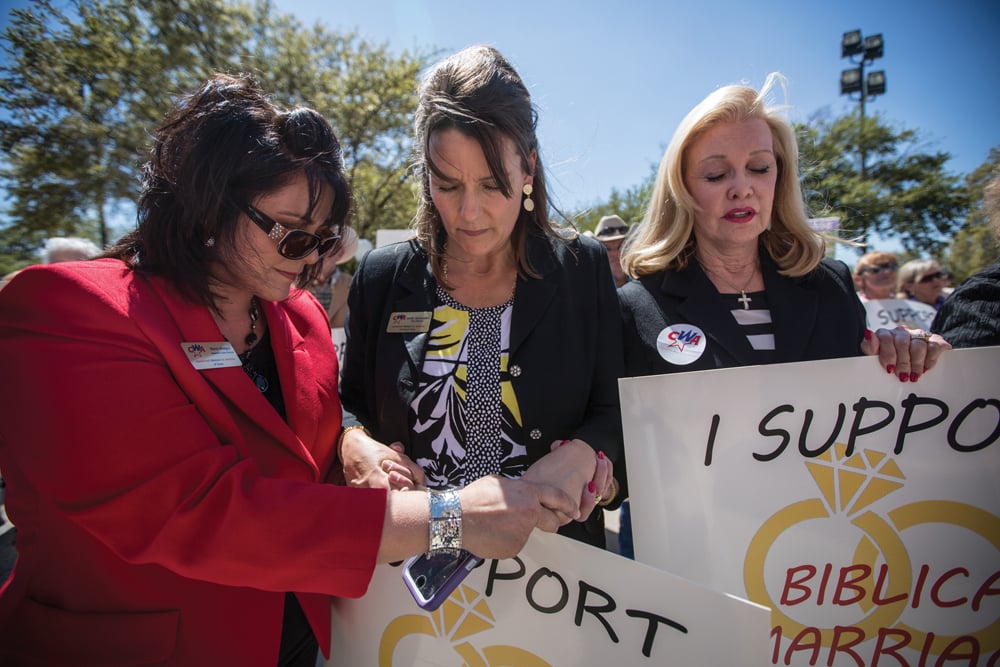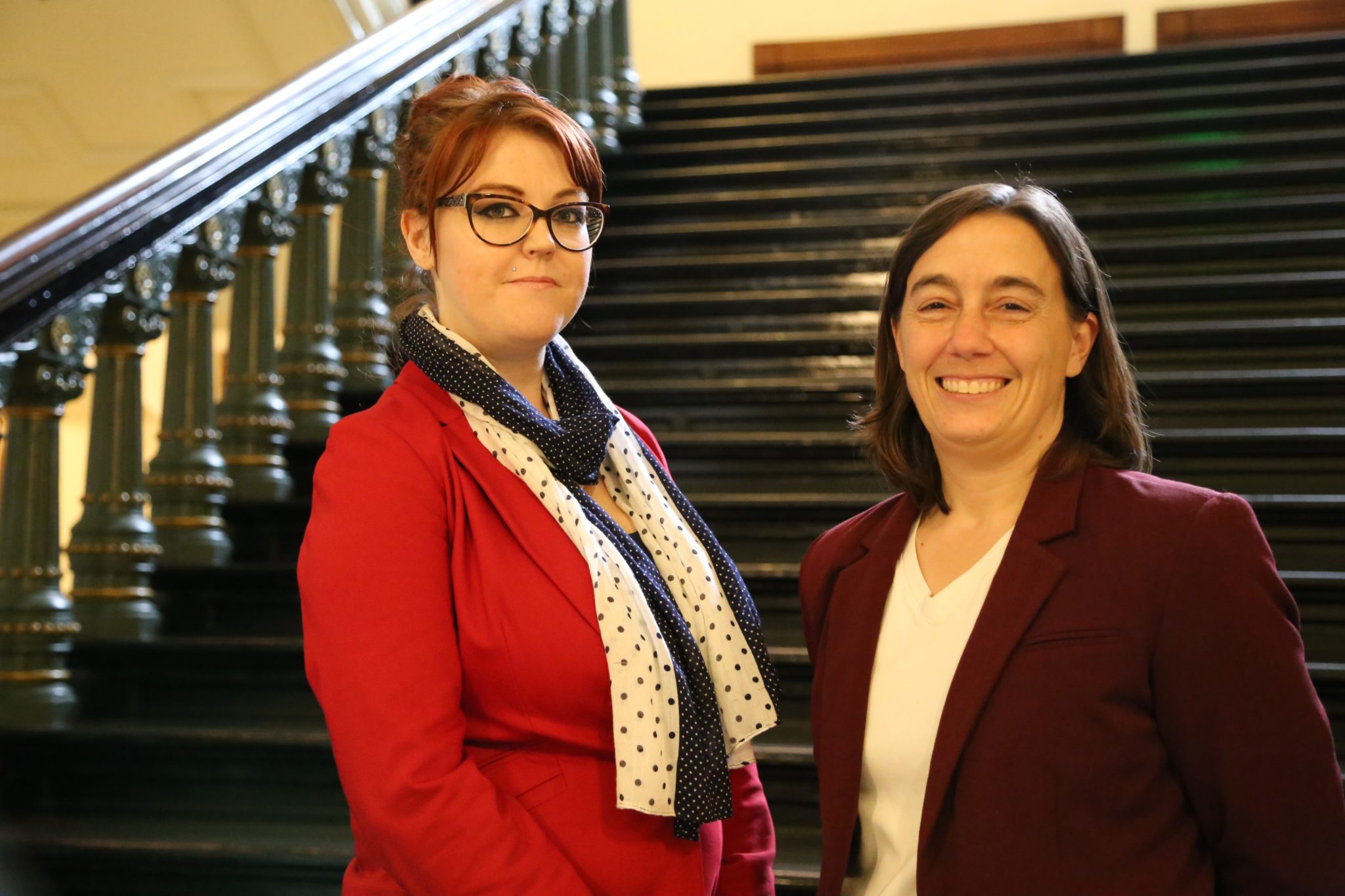
Gun Control Activists Fight to be Heard at Capitol
Opponents of open carry and campus carry say their access to lawmakers has sometimes been limited, even as the most extreme gun activists get meetings with top elected officials.

A massive winter storm shut down 700 schools and canceled 1,100 flights in Dallas on Feb. 23. But it didn’t stop Julie Gavran—a gun violence prevention activist with the Campaign to Keep Guns Off Campus—from braving the icy roads and making the long drive to the Capitol in Austin. That day the Senate was possibly going to debate a bill that would allow people to carry concealed handguns on college campuses. If there was going to be a debate on Senate Bill 11, if there was going to be a vote, Gavran wasn’t going to miss it for anything.
It was the third time in less than two weeks that Gavran had made the drive. She was determined to have her voice heard after what she considered dismissive treatment by powerful lawmakers. In particular, Gavran was still chafing about her experience a week and a half earlier at a critical hearing on SB 11 and another bill, SB 17, which would permit the open carry of handguns.
On Feb. 12, Gavran watched as a parade of invited witnesses spoke at the Senate State Affairs Committee. All eight of the witnesses, including representatives of the NRA and the Texas State Rifle Association (TSRA), testified in favor of the two gun bills. Not a single invited witness was an opponent.
Not that Gavran and her allies hadn’t asked to be included.
Prior to the hearing, she sent an email to Ben Stratmann, chief of staff for Sen. Brian Birdwell, the author of SB 11. She described her background as a campus gun violence researcher with a “unique perspective” because of her own direct experience with guns on campus. When Gavran was a student at Ohio Dominican University, another student “aimed a gun at her face and pulled the trigger” according to a 2013 New York Times article. Gavran told the Times that the gun was either jammed or not loaded, and no shot was fired.
Stratmann told Gavran in an email response that there would be no invited testimony, “including in favor of the bill.” So two days later, Gavran was surprised to see the eight pro-gun people testifying at the hearing.
Gavran was upset—she felt as if she’d been lied to. So she drove back to Austin a week later to hand-deliver a copy of the email exchange with Stratmann to each member of the committee. Stratmann insisted that his office hadn’t lied or stacked the testimony.
“I cannot in good conscience allow someone to think that I misled them,” Stratmann wrote to Gavran in an email. “That becomes an issue of my character—not legislation or politics. Our office has never done that, regardless of anyone’s stance on a bill.”
So how did the gun rights crowd end up dominating the hearing?
During the hearing, Sen. Joan Huffman (R-Houston), the committee chair, introduced another witness, Wesley Lloyd—a Waco-based lawyer—and stated that he’d been invited by Sen. Birdwell. Stratmann says he’s not sure how Lloyd “got placed in that category.”
Stratmann told the Observer he was always under the impression that there would be no invited testimony. He says that Sen. Birdwell’s office only ended up requesting that the committee invite one witness—McLennan County Sheriff Parnell McNamara—because his schedule demanded that he speak earlier in the day.
John Bennett, general counsel for Sen. Craig Estes (R-Wichita Falls), told the Observer that up until two days before the hearing, there wasn’t supposed to be any invited testimony. But this upset some gun rights activsts who wanted to testify on Estes’ bill, SB 17. One would-be witness—Bennett didn’t specify who—was particularly insistent that he or she be invited to speak, and once that witness was approved, the list snowballed. In the end, Estes’ office invited five witnesses to speak on SB 17, including three lobbyists for gun rights organization, one concealed handgun license instructor, and one self-described “life member” of the NRA and TSRA. Each of the speakers also expressed support for SB 11—the campus carry bill.
“I was really frustrated at our lawmakers’ seeming inability to pass common sense gun legislation. We need to let a voice of reason and common sense prevail in this state.”
Kristen Katz, another director for the Campaign to Keep Guns off Campus, says that it’s not “uncommon” for gun violence prevention activists to get nudged out of the debate at the Capitol, but “it’s never been this flagrant.”
Katz is also frustrated that during the Feb. 12 hearing, the State Affairs Committee members spent more time questioning those in favor of the bill than those speaking against it.
“You would see people that are pro-campus carry who had no real education, who didn’t work in any university system, didn’t work in law enforcement—they would ask them all these questions,” Katz said. “It was absurd that we have expert testimony and you’re ignoring them, and we have people with no expertise in this area and you ask them questions.”
Lloyd, one of the invited witnesses, has a law practice that focuses on environmental, real estate and construction law. He describes himself as an active member of the Republican Party and a father. He didn’t mention any personal connection to any campus shootings, but senators listened intently to his invited testimony, as he cited the Virginia Tech shooting as one of the reasons he supports campus carry. Later, when Colin Goddard—a survivor of the Virginia Tech shooting—testified, he had two minutes to speak and senators didn’t ask him any questions. Goddard, who works for Everytown for Gun Safety, had flown in from Washington, D.C., to testify at the hearing.
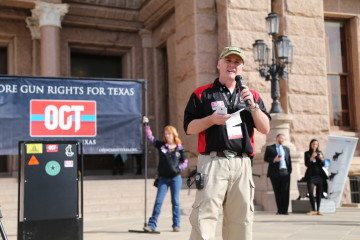
Lizzie Ulmer, the press secretary for the gun violence prevention group Moms Demand Action said that members of her organization were thankful to be given the opportunity to give public testimony. She said that the committee hearings have gone smoothly “given how contentious these bills are” and that legislators, in general, have been very respectful. The real trouble, she says, is the bullying and intimidation members receive from open carry activists.
Katz says that she also regularly gets threatening emails and phone calls. “We hope you get raped because you want to deny women the right to protect themselves” is a common line, she says. Her group keeps its meeting locations secret out of an abundance of caution.
“We are always open to civil, logical, rational dialogue with pro-gun groups,” Katz said. “We’re not anti-gun or trying to strip people of their rights. But it’s become apparent that they don’t seem to want to have a civil conversation with us.”
Angela Turner, a member of Moms Demand Action, thinks gun rights activists are going to “keep coming out in more extreme manners” because that’s what gets them attention.
The most extreme open carry activists have even threatened lawmakers, but that hasn’t kept them from scoring meetings with Lt. Gov. Dan Patrick. In late January, Patrick’s staff met with members of Open Carry Tarrant County, including its leader Kory Watkins. Two weeks earlier, Watkins and other OCT activists had sparked a confrontation with a representative that was so threatening, the House passed a rule allowing legislators to install state-funded panic buttons.
The day before that confrontation, Moms Demand Action members also visited the Capitol, delivering cookies to every legislative office.
Turner thinks that groups likes hers represent the vast majority of Texans. Turner is a gun owner and describes herself as very “pro-Second Amendment.” There’s a misconception that groups like Moms Demand Action want to strip people of their guns and rights, she argues.
“I was really frustrated at our lawmakers’ seeming inability to pass common sense gun legislation,” Turner said. “We need to let a voice of reason and common sense prevail in this state.”
According to a recent University of Texas/Texas Tribune poll, 67 percent of Texans oppose open carry. Seventy-five percent of police executives in the state also oppose open carry. A 2013 poll showed that voters in Texas were evenly divided on campus carry, but many students, faculty and staff at universities are against it. The University of Texas Student Government recently passed a resolution opposing campus carry with 20 out of 27 votes.
Nonetheless, many observers expect the open carry and campus carry bills will pass the Senate.
But Turner isn’t ready to give in just yet.
“It’s just inspiration for us to keep speaking up and making our voice heard in a respected and dignified manner,” she said.
Corrected: The original version of this story referred to Kory Watkins as the leader of the Tarrant County chapter of Open Carry Texas. In fact, Watkins is affiliated with Open Carry Tarrant County, which has no formal relationship to Open Carry Texas. The Observer regrets the error.
